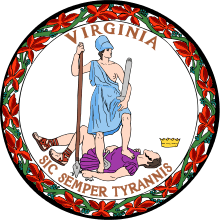Henry H. Wells
| Henry H. Wells | |
|---|---|
 Portrait of Governor Wells | |
| Provisional Governor of Virginia | |
|
In office 1868–1869 | |
| Lieutenant | Leopold Copeland Parker Cowper |
| Preceded by |
Francis Harrison Pierpont as Unionist Governor |
| Succeeded by |
Gilbert Carlton Walker as Governor |
| Personal details | |
| Born |
Henry Horatio Wells September 17, 1823 Rochester, New York |
| Died |
February 13, 1890 (aged 66) Palmyra, New York |
| Political party | Republican |
| Profession | Politician, Lawyer |
Henry Horatio Wells (September 17, 1823 – February 13, 1890), was a Union Army general in the American Civil War and a carpetbagger who served as the appointed provisional governor of Virginia from 1868 to 1869 during Reconstruction. He was defeated for election in 1869.
Early life
Henry Wells was born in Rochester, New York and grew up in Michigan. He studied in Detroit and was admitted to the practice of law. Among the cases he took were several in which Wells defended men accused of assisting runaway slaves.[1] He was later elected to the Michigan House of Representatives and served 1854 and 1856 as a member of the Republican Party.
In 1848 Wells married Millicent Hunt, with whom he had three children prior to her death in 1852.[2]
Wells in the American Civil War
During the Civil War he was lieutenant colonel of a unit from Michigan. This unit was an occupation force in the controlled part of the Union Army of Virginia. There, Wells was made head of military police in Alexandria and soon the whole of the Union-controlled territory south of the Potomac River. After the assassination of President Abraham Lincoln in April 1865, Wells played an important role in the pursuit and apprehension of the assassin, John Wilkes Booth, in a Virginia barn. As thanks for his help in the capture of Booth, Wells was appointed a brigadier general.
Political career
After the war, Wells settled in Richmond, Virginia, as a lawyer. He served as the appointed governor of Virginia from April 4, 1868 to September 21, 1869. His term as governor focused on drafting a new state constitution for Virginia. Wells' version would have granted African Americans the right to vote but would have disenfranchised Confederate veterans. Ulysses S. Grant intervened and protected the voting rights of the Confederate veterans.
After winning large majorities in the 1866 Congressional election, the Radical Republicans in Congress took full charge. They closed down the state's civilian government and put Virginia (and nine other former Confederate states) under military rule. Virginia was administered as the "First Military District" in 1867-69 under General John Schofield. Schofield appointed his friend Wells as provisional governor. The national government held elections in Virginia in 1869 that included a vote on the new state constitution, a separate one on its disfranchisement clause that would have stripped the vote from most former Confederates, and a separate vote for state officials. The army enrolled the freedmen (former slaves). The Republicans nominated Wells. The leader of the opposition "True Republicans" was William Mahone (1826–1895), a railroad president and former Confederate general who said it was time for a New Departure for the state's Conservative Party (it later merged with the Democratic party). That is, whites had to accept the results of the war, including civil rights and the vote for freedmen. Mahone's candidate for governor, Gilbert C. Walker, won support from the Conservatives and defeated Wells in 1869 and the disfranchisement clause was defeated. Virginia as a result did not experience the political conflicts that characterized the Reconstruction period in other southern states. Virginia was the only Southern state not to have a civilian Radical government.[3]
Accident
Governor Wells was in an accident in the Virginia State Capitol; he was injured when a balcony collapsed at a court hearing because of the crowds. The floor of the courtroom also collapsed and fell into the Hall of the Virginia House of Delegates. There were over a hundred injured and several dozen deaths. Wells failed to get elected as governor in 1869.
Later life
Until 1872, Wells served as United States Attorney for the Eastern District of Virginia. He later moved to Washington, D.C., where he served as United States Attorney for the District of Columbia. In 1880 he finally retired from public service employment and again worked as a lawyer.
On February 12, 1900 Wells died in his daughter's home in Palmyra, New York and was buried shortly thereafter in the Rock Creek Cemetery, located in Washington, D.C.[2]
References
- ↑ "A Guide to the Henry H. Wells Executive Papers, 1868-1869". The Library of Virginia. Retrieved 7 January 2014.
- 1 2 Tarter, Brent. "Wells, Henry Horatio (1823–1900)". Encyclopedia Virginia. Retrieved 2016-05-04.
- ↑ Nelson M. Blake, William Mahone of Virginia: Soldier and Political Insurgent (1935)
- Lowe, Richard. Republicans and Reconstruction in Virginia, 1865-70 (1991)
- Maddex, Jr., Jack P. The Virginia Conservatives, 1867-1879: A Study in Reconstruction Politics (1970).
- Robert Sobel and John Raimo (ed.): Biographical Directory of the Governors of the United States, 1789-1978. Volume 4, Meckler Books, Westport, 1978. 4 volumes.
- National Governors Association
External links
| Political offices | ||
|---|---|---|
| Preceded by Francis Harrison Pierpont Unionist Governor |
Governor of Virginia 1868–1869 |
Succeeded by Gilbert Carlton Walker Governor |
